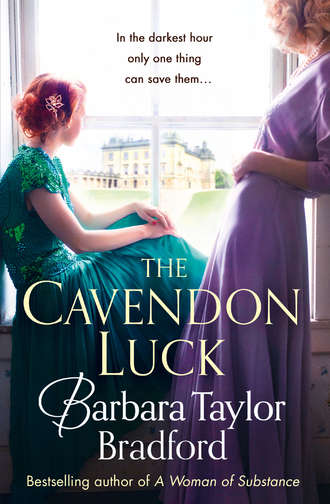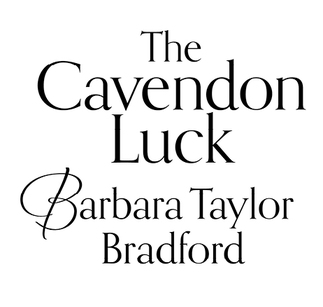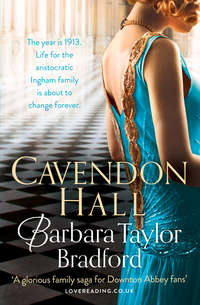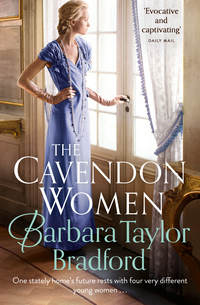
Полная версия
The Cavendon Luck



Copyright
Published by HarperCollinsPublishers Ltd
The News Building
1 London Bridge Street
London SE1 9GF
www.harpercollins.co.uk
First published in Great Britain by HarperCollins 2016
This edition published by Harper 2017
Copyright © Barbara Taylor Bradford 2016
Cover design by Heike Schüssler © HarperCollinsPublishers Ltd 2016
Cover photographs © Ilina Simeonova/ Trevillion Images (front); Angelo Hornak/ Corbis (house); London Express/ Getty Images (planes); Shutterstock.com (sky).
Barbara Taylor Bradford asserts the moral right to be identified as the author of this work.
A catalogue copy of this book is available from the British Library.
This novel is entirely a work of fiction. The names, characters and incidents portrayed in it are the work of the author’s imagination. Any resemblance to actual persons, living or dead, events or localities is entirely coincidental.
All rights reserved under International and Pan-American Copyright Conventions. By payment of the required fees, you have been granted the non-exclusive, non-transferable right to access and read the text of this e-book on screen. No part of this text may be reproduced, transmitted, down-loaded, decompiled, reverse engineered, or stored in or introduced into any information storage and retrieval system, in any form or by any means, whether electronic or mechanical, now known or hereinafter invented, without the express written permission of HarperCollins.
Source ISBN 9780007503339
Ebook Edition © June 2016 ISBN: 9780007503322
Version 2017-03-23
Dedication
For Bob, with all my love always
Table of Contents
Cover
Title Page
Copyright
Dedication
Characters
Part One: The Inghams & The Swanns
Predictions
Chapter One
Chapter Two
Chapter Three
Chapter Four
Chapter Five
Chapter Six
Chapter Seven
Chapter Eight
Foreign Intrigue
Chapter Nine
Chapter Ten
Chapter Eleven
Chapter Twelve
Chapter Thirteen
Chapter Fourteen
Chapter Fifteen
Chapter Sixteen
Chapter Seventeen
Chapter Eighteen
Games of Chance
Chapter Nineteen
Chapter Twenty
Chapter Twenty-One
Chapter Twenty-Two
Chapter Twenty-Three
Chapter Twenty-Four
Love in Many Guises
Chapter Twenty-Five
Chapter Twenty-Six
Chapter Twenty-Seven
Chapter Twenty-Eight
Chapter Twenty-Nine
Chapter Thirty
Chapter Thirty-One
Chapter Thirty-Two
Chapter Thirty-Three
Chapter Thirty-Four
Chapter Thirty-Five
Chapter Thirty-Six
Chapter Thirty-Seven
Chapter Thirty-Eight
Chapter Thirty-Nine
Chapter Forty
No Goodbye
Chapter Forty-One
Chapter Forty-Two
Chapter Forty-Three
Chapter Forty-Four
Chapter Forty-Five
Part Two: Women & War
Against All Odds
Chapter Forty-Six
Chapter Forty-Seven
Chapter Forty-Eight
Chapter Forty-Nine
Land of Hope and Glory
Chapter Fifty
Chapter Fifty-One
Chapter Fifty-Two
Chapter Fifty-Three
Fifty-Four
Chapter Fifty-Five
Chapter Fifty-Six
Chapter Fifty-Seven
Blitz
Chapter Fifty-Eight
Chapter Fifty-Nine
Standing Tall
Chapter Sixty
Chapter Sixty-One
Chapter Sixty-Two
Chapter Sixty-Three
Acknowledgements
Keep Reading …
About the Author
Books by Barbara Taylor Bradford
About the Publisher
CHARACTERS
ABOVE THE STAIRS
THE INGHAMS IN 1938
Charles Ingham, 6th Earl of Mowbray, aged 69. Owner and custodian of Cavendon Hall. Referred to as Lord Mowbray. He is now married to Charlotte Swann, 70, who is the 6th Countess of Mowbray.
THE CHILDREN OF THE EARL AND HIS FIRST WIFE, FELICITY, NOW DECEASED
Miles Ingham, heir to the earldom, aged 39. He is known as the Honourable Miles Ingham and is married to Cecily Swann, 37. They have three children: Miles’s heir, David, 9, Walter, 7, and Venetia, 5. Miles runs the Cavendon estate. Cecily commutes between Cavendon and their London townhouse to run her fashion business.
Lady Diedre Ingham Drummond, eldest daughter, aged 45. She is now widowed and lives in London with her son, Robin, 11. She works at the War Office again. They come to Cavendon at weekends where they have their own quarters.
Lady Daphne Ingham Stanton, second daughter, aged 42. She remains married to Hugo Ingham Stanton, 57. They live permanently at Cavendon Hall, in the South Wing, with their five children.
Lady DeLacy Ingham, third daughter, aged 37, living in London and at Cavendon. DeLacy remains unmarried. Long divorced from Simon Powers, she reverted to her maiden name years before.
Lady Dulcie Ingham Brentwood, fourth daughter, aged 30. She lives in London and at Cavendon. She is married to Sir James Brentwood, 45, one of England’s greatest actors, who was knighted by King George VI. They have three children: twins Rosalind and Juliet, 9, and a son, Henry, 6.
The four daughters of the Earl are still referred to affectionately as the Four Dees by the staff.
The children of Lady Daphne and Mr Hugo Stanton are Alicia, aged 24; Charles, 20; the twins, Thomas and Andrew, age 17, and Annabel, aged 14.
OTHER INGHAMS
Lady Vanessa Ingham Bowers, sister of the Earl, aged 56. She is married to Richard Bowers, 58. They live in London and at Skelldale House on the Cavendon estate, which Lady Vanessa inherited from her sister Lady Lavinia Ingham Lawson, deceased.
Lady Gwendolyn Ingham Baildon, the widowed aunt of the Earl, aged 98, who resides at Little Skell Manor on the estate. She was married to the late Paul Baildon.
The Hon. Hugo Ingham Stanton, first cousin of the Earl, aged 57. He is the nephew of Lady Gwendolyn, the sister of his late mother. He is married to Lady Daphne.
BETWEEN STAIRS
THE SECOND FAMILY: THE SWANNS
The Swann family has been in service to the Ingham family for one hundred and eighty-five years. Consequently, their lives have been intertwined in many different ways. Generations of Swanns have lived in Little Skell village, adjoining Cavendon Park, and still do. The present day Swanns are as devoted and loyal to the Inghams as their forebears were, and would defend any member of the family with their lives. The Inghams trust them implicitly, and vice versa.
THE SWANNS IN 1938
Walter Swann, valet to the Earl, aged 60. Head of the Swann family.
Alice Swann, his wife, aged 57. A clever seamstress who still makes outfits for Lady Daphne’s daughters.
Harry, son, aged 40. A former apprentice landscape gardener at Cavendon Hall, he is now running the estate with Miles.
Cecily, daughter, aged 37. She is married to Miles and is a world-renowned fashion designer.
OTHER SWANNS
Percy, younger brother of Walter, aged 57. Head gamekeeper at Cavendon.
Edna, wife of Percy, aged 58. Does occasional work at Cavendon.
Joe, their son, aged 37. Works with his father as a gamekeeper.
Bill, first cousin of Walter, aged 52. Head landscape gardener at Cavendon. He is widowed.
Ted, first cousin of Walter, aged 63. Head of interior maintenance and carpentry at Cavendon. Widowed.
Paul, son of Ted, aged 39, working with his father as an interior designer and carpenter at Cavendon.
Eric, brother of Ted, first cousin of Walter, aged 58. Butler at the London house of Lord Mowbray. Single.
Laura, sister of Ted, first cousin of Walter, aged 51. Housekeeper at the London house of Lord Mowbray. Single.
Charlotte, aunt of Walter and Percy, aged 70. Now 6th Countess of Mowbray. Charlotte is the matriarch of the Swann and Ingham families. She is treated with great respect by everyone. Charlotte was the secretary and personal assistant to David Ingham, the 5th Earl, until his death. She married the 6th Earl in 1926.
Dorothy Pinkerton, née Swann, aged 55, cousin of Charlotte. She lives in London and is married to Howard Pinkerton, a former Scotland Yard detective. She works with Cecily at Cecily Swann Couture.
CHARACTERS BELOW STAIRS
Mr Henry Hanson, Butler
Mrs Jean Weir, Housekeeper
Miss Susie Jackson, Cook
Mr Gordon Lane, Under butler
Mr Ronald Gorme, Second footman
Miss Kate Smithers, Head housemaid
Miss Brenda Caine, Second housemaid
Mr John Goff, Chauffeur
OTHER EMPLOYEES
Miss Angela Chambers, nanny for Cecily’s children, usually addressed as Nanny or Nan.
Miss Eileen Marks, the governess, usually addressed as Miss Marks. The governess is not at Cavendon in the summer. The children are not in school.
THE OUTDOOR WORKERS
A stately home such as Cavendon Hall, with thousands of acres of land, and a huge grouse moor, employs local people. This is its purpose for being, as well as providing a private home for a great family. It offers employment to the local villagers, and also land for local tenant farmers. The villages surrounding Cavendon were built by various earls of Mowbray to provide housing for their workers; churches and schools were also built, as well as post offices and small shops at later dates. The villages around Cavendon are Little Skell, Mowbray and High Clough.
There are a number of outside workers: a head gamekeeper and five additional gamekeepers; beaters and flankers who work when the grouse season starts and the Guns arrive at Cavendon to shoot. Other outdoor workers include woodsmen, who take care of the surrounding woods for shooting in the lowlands at certain times of the year. The gardens are cared for by a head landscape gardener, and five other gardeners working under him.
The grouse season starts in August, on the Glorious Twelfth, as it is called. It finishes in December. The partridge season begins in September. Duck and wild fowl are shot at this time. Pheasant shooting starts on 1 November and goes on until December. The men who come to shoot, usually aristocrats, are always referred to as the Guns, i.e., the men using the gun.
PREDICTIONS
Tinker, tailor,
Soldier, sailor,
Rich man, poor man,
Beggar man, thief.
Old English nursery rhyme
ONE
Cecily Swann Ingham stood on the outside steps of the office annexe at Cavendon Hall, glancing around. What a change in the weather, she thought. From a gloomy, overcast morning it had become a radiant afternoon.
Blue sky. No clouds. Brilliant sunlight filtering through the leafy trees. A perfect day in late July. A smile of pleasure touched her face fleetingly.
Walking down the steps and crossing the stable yard, she headed for the dirt path through Cavendon Park which led to Little Skell village.
Cecily thought suddenly of her son’s birthday earlier in the month as she strode ahead. It had poured with rain that day and spoiled their plans for the garden party. The celebration was held indoors in the end. She couldn’t help wishing it had been a glorious day like this. On the other hand, David hadn’t minded about the weather. It was his ninth birthday and he had enjoyed every moment, as had his brother, seven-year-old Walter, and their sister Venetia, who was five. It had been a happy time for the family, and that was what counted most; their enjoyment derived from the festivities, and what Miles always called the ‘gathering of the clan’.
Later that night when they were in bed, Miles had drawn her closer to him, and had wondered out loud where all the years had gone. She had said she didn’t know and had reminded him that time always flew when they were together.
He had laughed and pulled her even closer, stroking her hair. After a moment, she had added that they had been busy raising three children, going about their own business and keeping Cavendon safe.
She recalled how he had murmured his thanks for all that, had wrapped his arms around her, then slipped on top of her, kissing her, touching her tenderly. Within seconds they were making love to each other with the same excitement and joyousness they had always known.
Suddenly, remembering that night so clearly, she couldn’t help wondering if he had made her pregnant on their son’s ninth birthday? They had both been so eager for each other, and intense. It had been a passionate night.
The idea of pregnancy lingered. She was thirty-seven. If she was pregnant, then so be it. I must think of another child as a gift, because soon my child-bearing years will be over. But having a child with war coming? This thought troubled her. She pushed it away, and hurried on towards the village. And her mind turned to the huge amount of work she and Miles had done to make Cavendon Hall and the family safe. Her brother Harry had plunged in too, as well as her four sisters-in-law. They had been hard years in so many ways.
Each of them had made all sorts of sacrifices, and had frequently used their own money to keep everything afloat.
But they had done it.
The Inghams and the Swanns, pulling together, had accomplished miracles. Cavendon was now set on the right course. And it was safe.
Yet even now, today, there was that awful little knot in her stomach. Earlier, Cecily had put this down to her worry about Harry plus her concern for Greta, her personal assistant, but she knew instinctively that neither was the real reason for her anxiety.
It was something entirely different, and it troubled her constantly, nagged at her, gave her sleepless nights.
Germany’s menacing Third Reich was casting a giant shadow across Britain, as it had done for the longest time over central Europe. And that was causing her tension. The Reich was sinister and dangerous, and the threat of war hovered. Cavendon would be at risk if there was an invasion … the whole country would be at risk. And Europe, too. The whole world, actually. She understood that only too well.
When Cecily came to the walled rose garden she paused, then pushed open the heavy oak door and went down the steps. The fragrance of late-blooming summer roses enveloped her instantly. She breathed deeply and sat down on an iron garden seat. Leaning back, she closed her eyes, trying to relax for a few moments.
This lovely old garden had not changed for centuries; it was a tranquil refuge for her, as it always had been since she was a child. She sat in here almost every day, if only for a few minutes. She loved the scent of the roses, the peacefulness behind the high brick walls. This place soothed her troubled senses, helped her to clear her mind, sort out her worries.
Her thoughts went to her mother. Cecily knew she was busy with preparations for war, working with the women in the three villages who were members of the Women’s Institute. It was run by Charlotte, who was the president. They were quite an amazing collection of village women, and had come up with solutions to make life easier if war did come to their shores.
Of course it will come, Cecily muttered to herself. The Prime Minister, Neville Chamberlain, believed he could appease Adolf Hitler, who had already annexed Austria and was eyeing Sudetenland in Czechoslovakia.
On the other hand, Winston Churchill understood the futility and terrible danger of appeasement, and kept on warning the government that war was imminent. Churchill was right, she was certain of that. Horrific as that thought was.
The drone of a low-flying aircraft cut off Cecily’s thoughts, and she jumped up, lifted her head to the blue sky, and that first flash of fear dissipated at once.
The small plane did not bear the emblem of Nazi Germany, the swastika. It belonged to Noel Jollion, the nineteen-year-old son of Commander Edgar Jollion of the Royal Navy, who lived on the other side of Mowbray village, near High Clough. The commander had built an airstrip in a long field on his land at Burnside Manor because his son loved flying.
Returning to the garden seat, Cecily sat down, and tried to throw off her concern about the war. But she was finding it difficult this afternoon. It was on her mind.
Last week Hanson had taken her and Miles down into the vast cellars of Cavendon, and had shown them the preparations he had begun to make for war.
The cellars were always crisply clean, with whitewashed walls and well-swept floors. Hanson had pointed out a stack of camp beds which he had brought out of storage. There were sofas, armchairs and small tables, all of which had been in the attics. The Earl had told him to make the cellars as comfortable as possible, in case they had to live in them. Also all of the paintings and other objets d’art would be placed in the lower vaults as soon as there was a declaration of war between Britain and Germany, he had told them.
It seemed to her that Hanson, as usual, had been very efficient. There was even a refrigerator which had been purchased at Harrods and delivered by a Harrods van. What would they do without Hanson? He was supposed to retire in December. He was seventy-six and had been in service at Cavendon for fifty years. She for one hoped that wouldn’t happen. He looked as fit as a fiddle and they needed him.
Reluctantly, Cecily left her sanctuary, and continued on her way to her parents’ house in the village. But first she must stop at the Romany wagon where Genevra lived. She needed to talk to her.
TWO
When Cecily turned the bend in the dirt path, she immediately saw Genevra, who was sitting on the steps of the wagon, waiting for her. As usual, she was wearing an old Cecily Swann frock, given to her by Cecily’s mother. It was red-and-white striped cotton, a summer frock, and it suited her.
The gypsy raised her hand and waved.
Cecily waved back, smiling. She noticed that there was a wooden chair waiting for her. This thoughtfulness pleased her.
Genevra had an excited expression on her face, an expectancy about her. She was thirty-nine, the same age as Miles, though she did not look her age, appeared to be much younger. She was still a good-looking woman – dark, exotic – and her abundant hair was as raven-black as it had been in her youth.
When they had moved their wagons to the lower field five years ago, Genevra had invited Cecily into her wagon for the first time for a glass of mint tea. Not wishing to hurt her, feeling bound to accept this invitation, Cecily had gone inside and had discovered, to her enormous surprise, a treasure trove.
Genevra was an artist, and a talented one at that. The paintings on the walls of the extremely neat living area had astonished Cecily. They were landscapes of Cavendon for the most part, and executed in brilliant, vivid colours. Later, DeLacy had told her they would be categorized as Naïve art.
Yet they had a style, a genuinely unique style of their own. Genevra’s style, Cecily called it. The paintings were bold, commanding, caught the eye at once. But it was the shimmering look of the bright colours, the odd sheen on the canvas that captivated everyone, and at once.
Cecily had soon found out that Genevra had been painting since her childhood. Her brother Gervaise had encouraged her, and when she was older he had bought her canvases and oil paints when he could afford them. She was totally self-taught, a natural and gifted artist.
Cecily had instantly asked if she could buy one of them. Genevra had refused that day. Instead she had offered her a painting as a gift. In the end, Cecily had chosen one that was evocative, and very meaningful to her. The painting showed a corner of the high wall in the rose garden, and a profusion of late-blooming roses, a fusion of many different pinks and faded reds against a portion of the grey stone wall.
Genevra came down the steps to greet Cecily; as always she did a little bob, a sort of curtsey, as she took Cecily’s outstretched hand in hers.
‘I put out a chair, Mrs Miles,’ Genevra said, indicating the wooden chair.
‘Thank you,’ Cecily murmured, and sat down.
Genevra returned to her place on the steps.
Cecily stared at Genevra, frowning. She thought she looked a bit pinched, tired. ‘You haven’t been sick again, have you?’ she asked worriedly. She had not seen her for ten days.
Genevra smiled faintly. ‘No. Not sick. Good.’
‘You look a bit peaked to me.’





